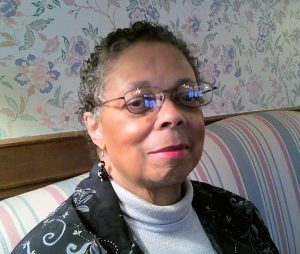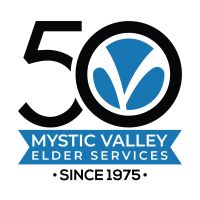
As part of our Black History Month observances, Mystic Valley Elder Services (MVES) is paying tribute to an amazing woman whose influence was felt deeply at MVES, in the community, and beyond.
When Mae Bertha Upperman passed away on September 25, 2024, she left a legacy of public service, including more than 20 years volunteering with MVES.
“Mae had a gentle spirit and genuine smile,” said Sandy Fall, one of the MVES team who got to know Mae when she was volunteering. “But she was as strong as she was sweet. She was an incredible advocate for women, particularly Black women, older adults, and children with disabilities.”
Mae had a large circle of friends, colleagues, neighbors and her “church family.” All knew Mae for her kindness and compassion. What many people didn’t know, even among her friends, was that Mae had built an archive of Black history – and that one day, Mae’s own story would become part of that collection.
Born in 1937 in Asbury Park, NJ, Mae grew up in the midst of race and wealth segregation. She lived quite literally on the “wrong side of the tracks.” The east side was an oceanfront resort town for wealthy seasonal tourists. The west was home to Black families and Italian immigrants. The two sides were separated by railroad tracks. Mae’s childhood experiences, along with the violence against Civil Rights activists in the 1960s, affected her deeply.
Mae attended college in an era when it was rare for women and even rarer for women of color. She earned a degree in Adult Education, Counseling and Physical Therapy from Tufts and then her master’s in education from Boston University. Later, she studied social policy at BC’s Graduate School of Social Work, with field study in the People’s Republic of China.
Mae devoted her career to helping others, as a physical therapist and in a variety of community health roles. Over the years she worked for the Visiting Nurses Association of Boston, Action for Boston Community Development (ABCD) and Head Start. She tapped into her health and education backgrounds to create programs for children with developmental disabilities. To better serve these children and their parents, she developed new service models and helped build interagency systems and networks.
In the community in and around Malden, Mae became known for her extensive volunteer work, especially through MVES and her church, First Baptist of Malden.
“Mae had a quiet strength that people really connected to – the older adults she volunteered with, but also the staff at MVES who were lucky enough to know her,” said Lisa Jimenez, who is now Clinical Services Director at MVES. “Mae never said no to someone in need. She kept on volunteering as long as she could. She believed in what we do here at MVES and she believed in giving back.”
Preserving History
Sandy, Lisa and some of their colleagues at Mystic Valley Elder Services are planning to take a trip to Amherst, MA in memory of their friend. Why Amherst? After Mae’s death they learned, along with many of Mae’s friends, that she had another legacy in addition to her life of service. She also had over 200 books by Black women authors. Some are famous, Zora Neale Hurston, and others are hard-to-find rarities.
In her later years, Mae wanted to find a place to house and preserve her library of women of color. One of her lifelong friends helped arrange for the books to become part of the Irma McClaurin Black Feminist Archives at UMass-Amherst. Today, the Mae Upperman Collection resides at UMass, but it’s not just books.
Mae hadn’t anticipated that her own voice would have a place in the archives. Her own work – visual art, poetry and other writings – are now part of the collection. The complexity of growing up Black in America, something she unpacked through in her writing and art, lives on.
The archives are “not for the rich, the famous, or the established public figures — they will always be visible. Instead, I seek to identify Black women from all walks of life who are artists, activists, and academics, but may not be so well known,” founder Irma McClaurin told the UMass Magazine.
McClaurin said the archives help ensure that Black women are seen, heard and remembered. And surely, Mae Upperman deserves to have her unique, inspiring story preserved as part of that history.
If Mae’s story has inspired you, please visit www.mves.org to learn more about volunteering and supporting Mystic Valley Elder Services.
For further reading about Mae Upperman, we encourage you to read this article in UMass-Amherst’s Daily Collegian. https://dailycollegian.com/2023/02/a-portrait-of-a-black-woman
